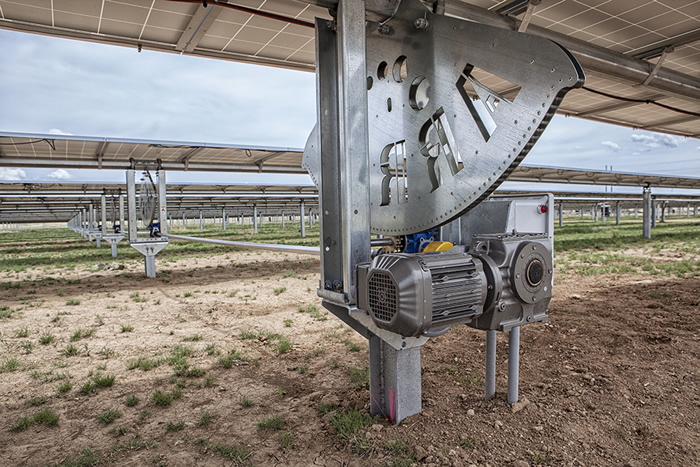The use of a tracking system for a utility-scale project not only reduces LCOE, but also provides more usable power by broadening the power production curve to provide a smoother flow of energy from dawn to dusk.
New at Intersolar - Single-axis Tracking System for Utility-Scale Solar
Ron Corio | Array Technologies
You have recently announced the launch of a new single-axis tracking system for utility-scale solar. What differentiates this system from others on the market?
That’s right, the DuraTrack v3 product combines over 25 years of tracker manufacturing experience with about 3 gigawatts of installations. Our experience, along with a company culture of innovation, has enabled us to create the most efficient tracker on the market. V3’s unique attributes include: the highest field density, the fewest motors, half the fasteners of any competitor, minimized foundation count, zero scheduled maintenance, and no active wind stow requirement, just to name a few. In fact, the intense integration of function in this system is so high we were even able to jettison the limit switches on v3. These attributes, along with the ability to follow terrain, enable the fastest install with the lowest install labor cost.

As an industry leader, how is Array contributing to the dissemination of solar as a proven, reliable and cost-competitive source of energy?
Our high volume success in the marketplace, history of reliability and constant product development continues to lower the cost of solar energy. The renewable energy market is elastic and expands as the cost of energy falls. ATI has created the most efficient tracking systems to provide the lowest Levelized Cost of Energy (LCOE) from a power plant. The greatest market driver is a low price per kWh. At Array we relentlessly develop innovative products and methods that increase power production, drive down the purchase price, lower construction costs, and long term maintenance cost which contributes in making solar energy competitive with conventional generation techniques.
As you look back over the past few years, what has enabled solar trackers to become more mainstream in the U.S. market, in your opinion?
 The cost benefit of tracking and our 25 year history of proven reliability. The use of a tracking system for a utility-scale project not only reduces LCOE, but also provides more usable power by broadening the power production curve to provide a smoother flow of energy from dawn to dusk. Trackers increase production during peak power demand times. A tracked PV system facilitates a more efficient use of materials, it provides a faster energy payback, optimizes LCOE and delivers more energy during peak demand.
The cost benefit of tracking and our 25 year history of proven reliability. The use of a tracking system for a utility-scale project not only reduces LCOE, but also provides more usable power by broadening the power production curve to provide a smoother flow of energy from dawn to dusk. Trackers increase production during peak power demand times. A tracked PV system facilitates a more efficient use of materials, it provides a faster energy payback, optimizes LCOE and delivers more energy during peak demand.
You will be exhibiting at Intersolar North America in July. What makes this such an important show for you and what can a visitor expect to see in the Array Technologies booth?
It is a business to business venue and we are primarily a B2B company. The timing of the conference is another important factor this year with the US PV industry in a phase of high market growth. San Francisco is a yearly gathering place for solar professionals from all over the world which provides a perfect opportunity to showcase our latest and greatest, including our company’s commitment to sustainable energy. This year, at our booth #9421, we will feature the recently launched DuraTrack HZ v3 single-axis solar tracking system.
What types of goals does a company like Array Technologies set for itself when exhibiting at a show like Intersolar?
One goal. Showcasing our new products in the most efficient way possible by getting face to face with our customers, letting them see and touch our latest technology and ask questions. It also gives us an occasion to interactively discuss the value proposition we offer.
From a personal stand point when you have an opportunity to tour the exhibit hall floor at Intersolar where do you go first? What are you most excited to see?
I like to try to walk the entire floor, visit with our project partners to learn if there is further product integration or product innovation that our customers can benefit from. Truth be told, I am most drawn to the start-up company booths, where I see innovation.
The content & opinions in this article are the author’s and do not necessarily represent the views of AltEnergyMag
Comments (0)
This post does not have any comments. Be the first to leave a comment below.
